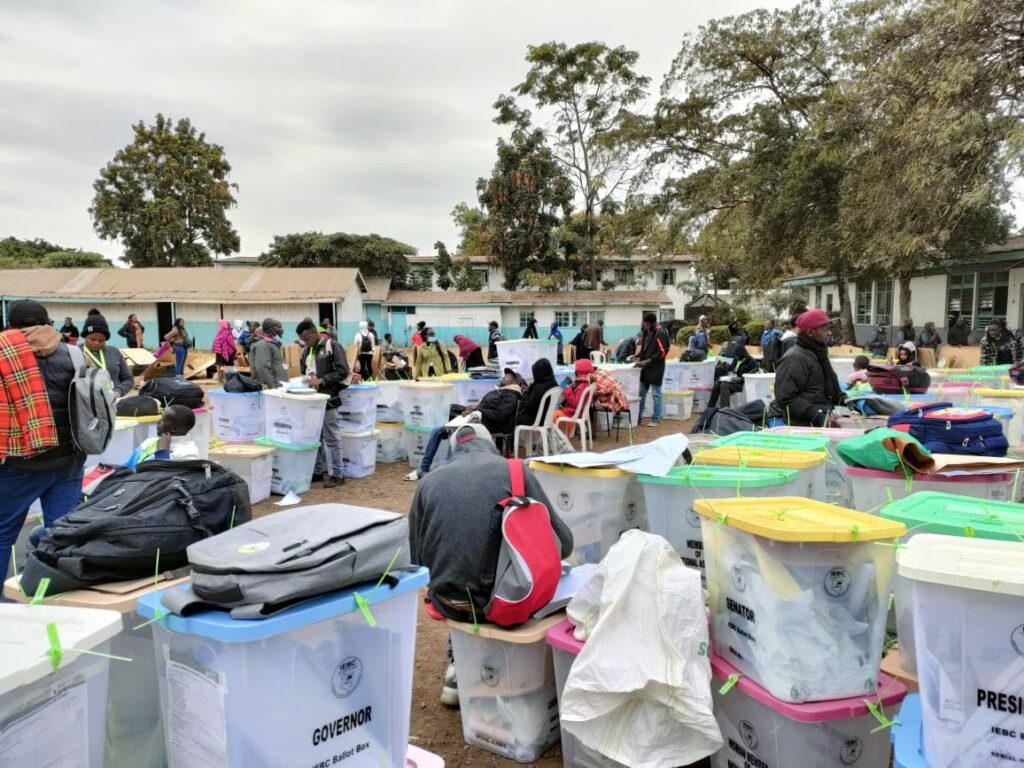Overnight, election officials worked to count votes and dispel rigging fears.
Kenyans awaited the results of the country’s presidential election on Wednesday, with low turnout in some areas indicating growing dissatisfaction with the political elite.
Although presidential frontrunners William Ruto and Raila Odinga have both pledged to maintain calm following Tuesday’s election, many Kenyans are still haunted by the memory of previous election-related violence, and they have urged political parties to accept the results.

With the Independent Electoral and Boundaries Commission (IEBC) under increasing pressure to declare the results by August 16, officials worked overnight to count votes and dispel rigging fears.
“We appeal to Kenyans for patience as we embark on this rigorous exercise, which we hope to complete as soon as possible,” IEBC chairman Wafula Chebukati said in a late-night briefing.
Kenyans voted in six elections on Tuesday, electing a new president as well as senators, governors, members of parliament, female representatives, and approximately 1,500 county officials.
Despite the initial enthusiasm, turnout in some areas appeared to be low, implying that for some Kenyans, patience with years of unfulfilled promises was running out.
Even those who voted early said they were tired of electing politicians who did little to improve their lives.
“We’ve been holding elections and getting promises, but nothing has changed,” said George Otieno Henry, a 56-year-old artisan.
“I hope it will be better this time,” he told AFP in Kibra, one of Nairobi’s largest slums.
According to the IEBC, turnout was at just over 56 percent of the 22 million registered voters by 4 p.m. (1300 GMT), 10 hours after polling began.
Comparable figures for the August 2017 election were not immediately available, but overall turnout in that election was 78 percent.
Living-cost crisis
Both Deputy President Ruto and Odinga, a veteran opposition leader now supported by the ruling party, have pledged to address the cost-of-living crisis and improve the lives of ordinary Kenyans.
However, many expect the pair to clash over the results, reflecting earlier polls in the East African country where no presidential election result has gone uncontested since 2002.
Ruto, once the heir apparent, was pushed to the sidelines after two-term President Uhuru Kenyatta, who cannot run for a third term, teamed up with his former foe Odinga, 77, in a move that stunned the country.
Since then, the wealthy businessman has positioned himself as the champion of “hustlers” struggling to make ends meet in a country ruled by “dynasties” – the Kenyatta and Odinga families, which have dominated Kenyan politics since the country’s independence from Britain in 1963.
With one-third of Kenya’s population living in poverty, economic pressures weighed on voters even before the Ukraine war drove up the prices of basic goods.
Prior to the election, some observers predicted that the economy would overtake tribal affiliations as a key factor influencing voter behavior, while others predicted that politicians’ failure to address the crisis would keep people from voting altogether.
“Many Kenyans… have cited their lack of trust in politicians to improve their current economic circumstances as the main reason for their failure to vote in the August polls,” Oxford Economics said in a note last week.
‘Peaceful and calm’
Analysts believe Odinga, a former political prisoner and former prime minister who is running for president for the fifth time, will edge out his younger rival.
If neither candidate receives more than 50% of the vote, Kenya will hold a run-off election for the first time in its history.
Kenya’s international partners are keeping a close eye on the election in a country regarded as a beacon of regional stability.
Local elections were halted in several areas on Tuesday, sparking a protest in one case, but police said the process had “remained calm and peaceful with no major incidents to report.”
Security was tight in order to avoid a repeat of the post-election violence that has afflicted Kenya in the past.
Following the 2007 election, there were politically motivated ethnic clashes that killed over 1,100 people, while Odinga’s challenge to the 2017 election result was met with a heavy-handed police response that killed dozens.


